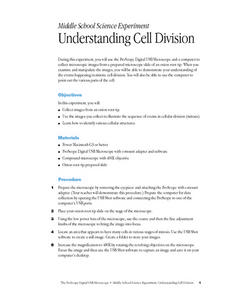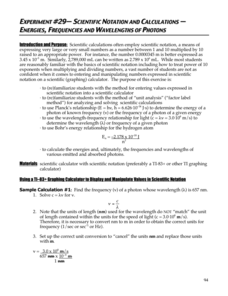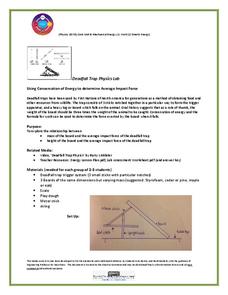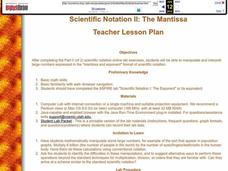Curated OER
Understanding Cell Division
Students collect and describe cells from an onion root tip which are undergoing the stages of cell division. They use a ProScope USB microscope to identify and compare cells in five phases of mitosis.
Curated OER
Balls & Hoops : Fun with Balls and Tubes
Students race to keep these balls rolling. In this early childhood physical education instructional activity, students experiment with cause and effect as they work with different heights of cardboard tubes.
Pingry School
Scientific Notation and Calculations – Energies, Frequencies, and Wavelengths of Photons
The calculator has an interesting way of displaying numbers in scientific notation, but don't let that confuse your pupils! A lesson designed to give learners practice with scientific notation and calculators provides several practice...
University of Saskatchewan
Using Conservation of Energy to Determine Average Impact Force
Explore the center of gravity with your science class as they create a deadfall trap with common materials. They research the concepts of energy conservation and gravitational force before dividing into small groups to create a model of...
Virginia Department of Education
Thermochemistry: Heat and Chemical Changes
What makes particles attract? Here, learners engage in multiple activities that fully describe colligative properties and allow the ability to critically assess the importance of these properties in daily life. Young chemists...
Curated OER
Chapter 1: The Science of Biology
Provide young biologists with everything they need to excel in the study of lymphatics, the nervous system, hormones, cellular division, and more! Pupils utilize the workbook, complete with end-of-chapter assessment worksheets, to...
Howard Hughes Medical Institute
Microarrays and Stem Cells
Background reading is available in the first two pages of this worksheet, along with reading comprehension questions and a laboratory activity in which students use mircroarray technology to identify genes used in cell differentiation....
Curated OER
Scientific Notation II: The Mantissa
Practice converting a conventional number into scientific notation, and vice-versa. Using an applet, they perform the operations of multiplication and division on numbers expressed in scientific notation.
Curated OER
Teaching Biology Through Bioinformatics
Learn more about the processes assisted by Bioinformatic Tools. Your class will learn how to research primary biological databases and the complex data that can be analyzed and manipulated to provide information. This information...
Curated OER
Elements of Biology: Genetics
Students study genetic manipulations and identify the solutions that could help to solve a problem. In this genetics lesson students divide into groups and research genetics for a debate.
Curated OER
What About Cantaloupes?
Second graders investigate the physical properties of cantaloupe using their senses. For this life science lesson, 2nd graders estimate the weight of their sample. They get it's actual weight and compare it with their estimate.
Curated OER
Dissecting Frog Embryos: Cell Membranes and Mitosis
Students use high powered dissection microscopes to dissect and examine frog embryos as well as see balls of cells that were produced by rapid division. The concept of mitosis links to the lesson.
Curated OER
Repeating Patterns
Pupils explore growth patterns by using manipulatives such as pattern blocks, investigate growth pattern of pattern, record growth in T-chart, describe how pattern is growing, and predict number of blocks needed to extend pattern.
Curated OER
Symmetry that is Basic and Beautiful
Students explore lines of symmetry. In this symmetry instructional activity, students divide and combine shapes along basic lines of symmetry. Students explore symmetry in real life objects.
Curated OER
Nand Gate Logic
Learners assess how to construct all possible circuits out of Nand gates. They divide into groups and are given a set of manipulatives to organize and explain the operation of a Nand gate. Each group recognizes the need to construct...
Curated OER
Environmental Education (Grade 4)
Fourth graders examine environmental concerns that affect their community. They work together to develop possible solutions and share them with the class. They ask questions to end the lesson.
Curated OER
Antacid Tablet Race
Students complete experiments to determine how rocket fuel is affected by surface area and temperature. They compare the reaction rates of antacid tablets. They discuss their results to complete the lesson.
Curated OER
Human Number Line
Fourth graders become aware and comprehend number relationships among those numbers most commonly found in geometric applications. They work in groups, 4th graders arrange themselves in order form the least to the greatest number in...
Curated OER
A New You!
Science learners journal familiar ways that the human body can regenerate or heal itself. In small groups, they research and create a poster of current information on stems cells and how they can be used to regenerate. The article for...
Curated OER
Paper Airplane Contest
Students research principles of flight. They design their own paper airplanes and make predictions about the performance of different designs. Students keep track of their findings in an electronic journal.
Curated OER
Density
Students determine the density of different substances. In this physical science activity, students rank them according to their density. They discover the relationship between volume and density.
Curated OER
Why Do Certain Things Float, While Some Sink?
First graders conduct an experiment. In this density lesson, 1st graders work in groups to test 10 different objects to see which ones sink and float. Students discuss why certain objects float and others do not.
Curated OER
Energy Activities
Students conduct a variety of experiments related to solar energy, heating, cooling, gravity, physical insulation and wind. They consider how the experiments relate to energy and the consumption of energy and then participate in a class...
Curated OER
Gas Laws Experienced
Students discover relationship between temperature pressure and volume as they perform research and experiments.























